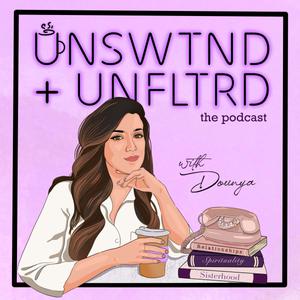
Unswtnd + Unfltrd
Unswtnd+Unfltrd
A space for women to feel like they are not alone in the hardships or struggles that they are facing. Some conversations may be lighthearted, some may touch upon taboo topics, but the overall mission for this podcast is to make every woman realize that she is not alone in whatever struggle she may be going through. We are all in this together, I promise.
- 49 minutes 29 secondsMuslim Women in the Workplace: Advice on Pivoting Careers and Gaining Confidence w/ Maariyah Choudery
We have all heard the phrase : follow your passion and everything will fall into place.
But I also can't help but to think of another very popular phrase which is : some things are much easier said than done.I find it funny that when I was younger and I was asked 'what do you want to be when you grow up', my response was one that was very confident and it came with no hesitation…mind you I was also five years old at the time.
But if you were to ask me this same question today, I would be confident in saying that I actually don’t know.
Now this isn't to say it’s a bad thing to not be able to pinpoint what it is that you want to do for the rest of your life…and that’s because we’re finally realizing we are multifaceted human beings who are constantly growing, learning and embracing different versions of ourselves.
Of course, change can be frightening, especially in today’s world which is laced with so much uncertainty, but what do you do if you no longer enjoy the career path you had chosen for yourself?
In today’s episode, I have an insightful conversation with none other than Maariyah Choudrey, who is a Chief of Staff at Uber, content creator and your big sis in tech!
Chances are you have come across a post or video of Maariyah’s account, which is @lifewithmaars, where she shares business tips and advice for working women, her love of modest fashion and beauty, and where she documents her adventures as a foodie in NYC.
So, what is the secret of those who do make it to the other side? The ones who take the leap and pivot careers?
In this conversation, Maariyah shares her career transition journey from pre-med to finance and her most recent role in tech. We also navigate the ways in which one can leverage their skills and their network to successfully pivot careers.
Fear of failure may be at the forefront of our minds, but Maariyah discusses her own personal experiences with self doubt and finding the confidence within her that is needed to move forward.
As Muslim women, in today’s society, how can we show up as our full selves in the workplace without comprising our beliefs and faith?
Tune in to find out!
Enjoy and follow the pod on Instagram:
@unsweetenedandunfiltered
Follow Maariyah on Instagram:
@lifewithmaars21 June 2022, 10:00 pm - 49 minutes 54 secondsGod's Plan vs Our Plans: The Intersection of Grief and Gratitude w/ Halima Jama
What do you do when the things you want most are happening for everyone but you?
Who do you become when your plans don't fall through? When you are in the waiting period of your life?
When I look back on my own life journey thus far, I realize that if everything had gone according to my plans and not God’s Plan, I don't think I would have been as intentional or filled with all of the gratitude I have for all that I was blessed with today.
Maybe my relationship with Allah wouldn’t be as strong as it is today, either. Today I am a bit more grateful that my life path came with a couple of bumps in the road and just the right amount of rerouting. I am where God has intended for me to be.
A delay in our plans is essentially Allah gifting us with more time. Time to work on ourselves. To prioritize the blessings we have right in front of us and maybe this delay is a much needed breather.Subhanallah, how even in the delay there is khair and you can almost see how Allah is working on you, bettering you for the next chapter of your life. A chapter that includes an answered dua of yours. And so while your dua is coming to life, Allah is also preparing you for it.
In today’s episode, I sit down with a dear friend of mine, Halima Jama. Not only is she a talented photographer but she is the type of sister that is always right on time with her words of encouragement. She is the friend who will send you a reminder at 2am letting you know how much you are loved. And for me she is a reminder of Allah’s mercy.
And in our discussion Halima reminds us that two things can be true - we can grieve what we had hoped to be and we can be grateful for what is right in this moment.
In the process of holding on and believing that relief is being sent our way from Allah, we have to also come to terms that there will be setbacks and loss along the way. Every single thing that happens to us, is happening for us and it’s all part of the most intricate puzzle known to mankind and that is God’s Plan.
Let that sink in - look back at how things in the past have unfolded and how you had become grateful for the way that things worked out. How every detail and every single event happened in the way that Allah had written. Look at how meticulous God is - how He creates every single thing with a purpose and you are no different.
In today’s conversation we are reminded that our life story is in the palms of Allah. Our life story is in the hands of our Creator. Our life story is being handled by the most Merciful and loving beings we will ever come to know.
Enjoy and follow the pod on Instagram:
@unsweetenedandunfiltered
Follow Halima Jama on Instagram:
@halimajama
Check out Halima's work:
Click here7 June 2022, 10:00 pm - 1 hour 5 minutesSelf Growth for an Arab Woman: Balancing a Relationship w/ Our Parents and Navigating Emotional Independence w/ Abeer Najjar
Going after what makes you happy as an Arab Muslim woman doesn’t always come with instant gratification. There is pain and guilt involved when finally making a decision for yourself.
I often wonder to myself, will I ever experience happiness without allowing myself to poison the moment by the idea that I’m making others unhappy in return.
Grief is interesting when it shows up in moments where you are welcoming a new chapter in your life - a chapter you have been making dua for for the longest. Yet somehow and someway without an invite, grief can show up and incessantly knock on your door and you have no choice but to acknowledge it.But I’m trying my best to not allow grief to paralyze me, or to instill fear in me and prevent me from entering this new chapter of my life.
I am someone who has stayed in her comfort zone for far too long and so, naturally self doubt is trying to keep me here a bit longer but for the first time I’m refusing to do so.
Someone else who may understand what I am going through is none other than Abeer Najjar. She is a self taught chef and food writer, born on the Southside of Chicago to Palestinian immigrant parents - and in today’s episode Abeer shares with us her journey of self growth and self development as an Arab woman.
I have a heart to heart with Abeer in regards to some of her most recent decisions that she has made and how that has impacted her relationship with her parents. I’ve realized that when discussing the topic of self development as an Arab woman it is almost impossible to not touch upon our past and current relationship with our immigrant parents and how that has shaped the decisions we are making today.
As grown adults how can we transform our bond with our parents to welcome them into the new chapters of our lives?
We also can't forget about the picture of Abeer at Umrah going viral - a picture that had captured a beautiful moment between Abeer and her brother - but I also wanted to discuss the experiences she had at Umrah, the ones that weren't captured within this photo and the reflections she can share with us that she has brought back from her trip.
How does ihsan and taqwa play a role in our lives as Muslim women who are trying to forge a new path for themselves, while balancing a relationship with their parents and working towards emotional independence?
Enjoy and follow the pod on Instagram:
@unsweetenedandunfiltered
Follow Abeer Najjar on Instagram:
@abeernajjar_
Check out Abeer's blog:
Click here24 May 2022, 10:00 pm - 53 minutes 9 secondsEgg Freezing Journey: Discussing Our Biological Clock and the Pressures of Having Children w/ Koko Zuberi
Each of us are on our own unique life journey and for some of us we have yet to find the one to start a family with, so what do we do when society is constantly reminding us of our ticking biological clock and how do we approach the conversation of having kids when we are truly ready?
For the past year, I have been a bit anxious when I think about my future and having children of my own inshallah. This anxiety stemmed from realizing that marriage may not be written for me at this very moment and my age is definitely not waiting on me to find the one.
Like most, this is a very intimate conversation that I have been having within my circle of close girlfriends. Unfortunately, for some of us, we didn't learn much about fertility in our early 20s and fast forward to today, we are in our 30s and unsure of what next steps to take when it comes to the topic of having kids and what options we have in preserving our fertility.
We are all asking ourselves the question: should I be worried about my biological clock?
Thankfully, there have been notable technological advances when it comes to reproductive health care but what does that mean for us?
In today’s episode, I sit down with Koko Zuberi, she holds an impressive background in working with UN Women in the Partnerships and Outreach sector and someone who is graciously choosing to share her own personal experience with the egg freezing process.
In this conversation, we share our thoughts on the pressures women face to start a family, how we truly feel being in our 30s and being unmarried, and what motivated Koko to make the decision of freezing her eggs?
We stress the importance of paying our doctors a visit to get checked, regardless if we are ready to have kids or not and how does one have this super serious conversation with our potential partners - especially when they may be oblivious to our biological clock. And of course we can't forget our parents and what this means for them as well.
Having conversations like this is vital, while some of us may have a strong support group, there are many others out there who may not have someone to turn to when discussing topics such as fertility - and so I hope this discussion sheds light on this, quote on quote, taboo topic.
I also want to stress the fact that Koko and I are not medical professionals, nor are we scholars. Please consult with your trusted doctors and Islamic advisors if you are seriously thinking about egg freezing.
Enjoy and follow the pod on Instagram:
@unsweetenedandunfiltered
Follow Koko Zuberi on Instagram:
@heyitsmekoko10 May 2022, 10:00 pm - 1 hour 20 minutesSpiritual Death of the Heart: What Happens in Between Our Death and the Hereafter
Death isn’t the greatest loss in life, it’s the spiritual death of our hearts while we are still living.
I once heard that we treat death like a mystery, when in fact, it’s the one experience all of us are guaranteed to share.
As human beings living in this dunya, we tend to not see the shape of the life we’ve lived until we have reached the end of it. Subhanallah how death is the one thing that simultaneously kills us but also motivates us to live a very fulfilled life, a life that Allah is pleased with.
Through seeking knowledge surrounding this topic I have read that the acceptance of death is not the same thing as giving up on life, instead it allows us to bring meaning to our lives.
But why do we fear it so much? And for me personally, if I can’t handle the death of a loved one, how can I ever prepare myself for my own death?
In today’s episode I sit down with Lena Tleib, a humanitarian, a community leader, and someone who is very active in the civic and social sector.
Lena is someone whom I’ve had the pleasure of attending her lectures and someone who gives great advice and insight pertaining to our faith. And so, she was the perfect guest to discuss the topic of the Hereafter.
She is also someone who performs ghusl at our local Masjid - which is the process of washing the bodies of the deceased. I wanted to learn more about how this experience has shaped her connection to Allah and strengthened her in her faith.
How can we be more comfortable with transitioning from this dunya to the Hereafter? How can we have the Akhira in our hearts and the dunya in our hands?
If the belief in life after death is central to the meaning and purpose of our lives as Muslims, then how can we truly believe in the temporariness of this dunya and the permanence of the Hereafter?
Enjoy and follow the pod on Instagram:
@unsweetenedandunfiltered
Follow Lena Tleib on Instagram:
@lenatleib
Follow Lena Tleib on Facebook:
Click Here
Check out Lena's Zakat Fundraiser:
Click Here26 April 2022, 10:00 pm - 58 minutes 53 secondsAm I Worthy of God's Forgiveness: How Do We Bring Our Imperfections to His Perfection w/ Samia Mubarak
I once heard that if the battle is bigger than you, than it’s not only your battle to fight, God is reminding you to seek His help in these moments, too.
I believe that sometimes we tend to focus more so on the state that we’re in when entering Ramadan instead of shifting our focus to our potential in this month. We can be discouraged in where our hearts may be when approaching Ramadan, not realizing that the purpose of this month is for us to seek the healing we desperately need. I truly believe we always leave Ramadan better than we have entered it.
When growing up, to no one’s fault, I felt like our faith was more about restriction than anything else, but over the years I set the intention to truly connect to Allah and the more knowledge I sought, the more I understood that our faith was about protection.
Allah has protected us from harm in more ways than we can ever count, in ways that are not so visible to us and in moments when we forgot to even make dua to receive His protection in the first place. Allah’s protection is one of the many ways His mercy is shown to us. My heart erupts with so much love for Allah, when I look back on moments where I felt so lost and so alone, and yet He lovingly nudged me back onto the right path, reminding me that no matter how far I’ve strayed, He always called me back to Him.
In today’s episode I sit down with Samia Mubarak, a student and teacher of the Quran and a Special Needs Advocate. This episode brought tears to my eyes and relief to my heart because of the way Samia invokes such love in our hearts for our Creator and in the ways she breaks down every verse, showing us that every surah is a love letter written to us by Allah (swt), guiding us back to Him.
The topics may be heavy within this discussion but Samia’s reminders are filled with pockets of ease that we truly need to hear and for us to allow it to wash over our hearts, hearts that may be shattered and in need of mending.
Within this conversation, we discuss the purpose of our hardships, how to soften our hardened hearts and to not be discouraged by our sins and our shortcomings, how to truly bring our imperfections to our Creator who is perfect, how to know the difference between the hardships we can overcome on our own and what can we leave for Allah to take care of on our behalf and how to know we have truly been forgiven?
I highly recommend that you check out Samia’s instagram account for inspiring content that reminds us of Allah’s love and mercy and to sign up for her Quranic Reflection classes. A great way to truly strengthen this sisterhood and to reap the rewards by doing so, is donating a Quranic class so that other women can connect to the Quran and our faith.
All links are provided in the episode show notes!Let’s dive in.
Enjoy and follow the pod on Instagram:
@unsweetenedandunfiltered
Follow Samia Mubarak on Instagram:
@quranic_ocean
Check out Samia's website and courses:
Click Here
Huge thanks to Podcorn for sponsoring this episode. Explore sponsorship opportunities and start monetizing your podcast by signing up here: https://podcorn.com/podcasters/12 April 2022, 11:00 pm - 46 minutes 2 secondsConnecting to the Quran: Navigating Shame and Imposter Syndrome While Connecting to our Faith featuring Dr. Saadia Mian
If you find darkness in your heart after you’ve sinned, know that in your heart there is light, and only because of this light you felt the darkness.
Ramadan Kareem everyone, subhanallah, what a beautiful gift we have received from Allah to witness another Ramadan. Take a moment to soak this in. May this month soften our hearts to allow the blessings of Allah to make their way in. May we find the ease we have been desperately seeking and the guidance we have been praying for. May every one of our tears and every one of our prayers reach the Heavens and in return we reap the rewards of trying our best to spiritually connect to our Creator. May we be overwhelmed by the infinite love of Allah, the time spent with our loved ones over Iftar and may Allah protect those who are oppressed. May we truly come together as an Ummah, to hold compassion for one another and truly welcome each other with no judgment, may our hardships allow us to extend our mercy onto others, knowing that they too have faced their own battles. May this Ramadan truly change us, Ameen.
Recently I came across a question that I would like to share with you all:
What use is armour anyway, when the worst critic is in your own head?
I want you to take a moment to reflect upon this question, put pause on this episode if needed. In Ramadan, we are reminded of how the Shaytaan is locked up and so we realize it is our responsibility to try our best to work on our nafs and take accountability of our actions.
I dont want to share this reminder to overwhelm you with the feeling of you are not a good Muslim if you’ve experienced anger or any sort of shortcoming for the past few days of Ramadan. Instead I want you to realize that the shame you are still carrying, the shame that is preventing you from performing various acts of worship may be coming from our own limiting beliefs.
In my own personal experience, a few months ago, I felt an immense amount of shame dusting off my Quran, physically dusting it off. And in that moment I could have chosen to drown in that shame and have the Quran continue to collect dust or I could thank Allah for planting this desire in my heart to connect to His words.
And so in this episode I sit down with Dr. Saadia Mian, author of The Crowning Venture, to discuss her own personal journey of connecting with the Quran. How she had gone from initially wanting to learn Arabic to instead memorizing the Quran, mashallah. It was honestly meant to be for me to cross paths with her book and it’s truly what pushed me to find my own way to connect with the Quran.
In this conversation we speak of our own personal experiences of how we opened our hearts to the Quran, our bouts with imposter syndrome when it comes to our faith and how the Quran can truly transform us.This episode is tailored to anyone who wants to start their journey of connecting to the Quran, to anyone who is struggling with shame or guilt, and to those who are looking for a space where they are not overwhelmed with the notion that they are not good enough for Allah’s mercy or guidance.
Enjoy and follow the pod on Instagram:
@unsweetenedandunfiltered
Follow Dr. Saadia Mian on Instagram:
@saadiamianmd
Purchase 'The Crowing Venture" here:
Click Here
Check out Dr. Saadia's website and courses:
Click Here
Huge thanks to Podcorn for sponsoring this episode. Explore sponsorship opportunities and start monetizing your podcast by signing up here: https://podcorn.com/podcasters/5 April 2022, 11:00 pm - 43 minutesSeeking Closure: What Does it Mean When We Say Closure Comes from Us w/ Sara Kuburic
What does it truly mean when we say closure comes from us and what if we feel like the relationship isn’t really over?
When you really think about it - no one ever really goes away completely. They either live in our minds, our hearts or both.
From time to time we may find ourselves in a chapter in our lives where we may be dealing with a generous amount of unanswered questions and the lingering feeling of not knowing if we made the right choice. From dealing with a relationship ending, to trusting yourself again, and of course the struggles we face when giving and receiving the honest, and at times, brutal truth - we can't help but to desperately search for the closure we need in order to move forward in life.
When focusing on the topic of honesty - I find myself searching for it but am I really ready to receive it - unfiltered and void of it being sugarcoated? How does honesty play a role when seeking closure and what do we do when self trust and self forgiveness are not things that we have yet mastered? How do we not fall into the trap of believing that closure comes from those who have potentially hurt us and where an apology is still pending?
In today’s episode, I had the pleasure of sitting down with Sara Kuburic, who is also better known as the Millennial Therapist for her instagram account where she shares tips and content related to mental health, self reflection and real life human experiences. I am truly grateful to have had this discussion with Sara - and her ability to lead with compassion in answering every question I had asked.
We also discussed the struggles of accepting how others may not even realize what they have done to us, if it’s even possible to go back to who we used to be before certain relationships ended, how self sabotage can sneak it’s way into the decisions that we make for ourselves and so much more!Enjoy and follow the pod on Instagram:
@unsweetenedandunfiltered
Follow Sara Kuburic on Instagram:
@millennial.therapist
Check out Sara Kuburic's site:
Click Here29 March 2022, 11:00 pm - 52 minutes 25 secondsHighly Sensitive Person: The Signs, Challenges and Strengths of Being Sensitive w/ Dr. Ketam Hamdan
You know for the most part I’m a pretty laid back person. I only care about two things:
the well being and the opinions of every single person on this earth, literally everyone, even strangers.If you ever found yourself in battle with literally yourself on a daily basis, then this conversation is just for you. It will shed light on the possible culprit which is the trait better known as Highly Sensitive Person or HSP for short.
For thirty years of my life I have struggled with being, quote on quote, too sensitive and the crushing psychological weight of feeling everything on a much deeper level than anyone else.
The ability to pick up on the most subtle changes, even a change of tone via text that will leave me wondering all week long if I did something wrong.
Or my most impressive talent yet which is the ability to knock out anywhere at anytime because my nervous system is constantly on overdrive from experiencing emotional burnout as an HSP.
For the longest I had wondered to myself, why did God create me to have too much feelings. I lack the ability to detach myself from everything and avoid becoming emotionally invested in anyone.
This was all before I read Elaine Aron’s book, The Highly Sensitive Person and now everything that I was experiencing started to make sense to me.
In today’s episode, I had the honor to sit down with Dr. Ketam Hamdan, an Arab American licensed therapist and educator who is also the managing director of Annisa’s mental health department, a non profit organization that works with Muslims in crisis.
As an HSP herself, Dr. Ketam gives us an insight of what it means to navigate life when we may have high levels of sensory processing sensitivity and a strong reactivity to our surroundings. We also delve into the positive and admirable aspects of being an HSP which includes being creative, the ability to cultivate deep connections with others and our thirst for knowledge.
This episode is recommended for anyone who may know an HSP or may be an HSP themselves. There is so much to cover in regards to growing up as an HSP, overcoming the struggles of setting boundaries and how our spiritual journeys may differ from others.
Enjoy and follow the pod on Instagram:
@unsweetenedandunfiltered
Follow Dr. Ketam Hamdan on Instagram:
@brainhealthdoc
Check out Dr. Ketam's site and educational videos here:
www.brainhealthgrowth.com15 March 2022, 11:00 pm - 1 hour 5 minutesCultural Constructs: Stigma of Being Single and Navigating Relationships Post Divorce
How do you handle being pressured into a relationship you don’t want and why does society stigmatize women who choose to be single?
At times society tends to be outspoken when it comes to seeing people engaging in different life choices and that includes being single. It seems as though, whatever cultural background you come from, being divorced and choosing single-hood can make those around you scratch their heads a bit.
In this episode, I sit down with Mai Abdeljaber, a first generation Palestinian-American writer, editor, content creator and media professional. She earned her degree in Communications, Media Studies and Psychology and is currently pursuing a Masters of Science in Psychology.
The topic of divorce is no stranger to this podcast, but today’s conversation will peel back a few more layers that are in dire need of attention. Mai and I each delve into our own personal life journey post divorce and the unsolicited advice we’ve received from others, including strangers, about how to move forward. When strangers find out that Mai has chosen to be single for the last couple of years, their match making skills take center stage.
So why is being single viewed as a shortcoming and why aren’t we talking about the cultural constructs that are to blame at times when it comes to the demise of certain relationships?
In this conversation, we discuss the impacts of divorce and how it can make you question everything you know about love and even yourself. We dive into the stark contrasts between the life choices we are making versus that of our parents and how it’s not a marker of failure if our lives do not mirror theirs.
Most importantly we discuss the complexities of how men have been conditioned to view relationships, the pressures that they face themselves and regardless, if you’re single, married or divorced, this conversation touches on the various family dynamics and how they affect the way that we navigate today’s relationships.
Enjoy and follow the pod on Instagram:
@unsweetenedandunfiltered
Follow Mai Abdeljaber on Instagram:
@mai_abdel
Check out Mai's articles here:
Click here2 March 2022, 12:00 am - 47 minutes 22 secondsIs God Angry w/ Me: The Journey of Surrender and Acceptance w/ Shakirah Sabira
*Content Warning: this episode discusses topics such as pregnancy loss and miscarriage*
How does one come to terms with any hardship in their life where you have to accept what is happening to you while it’s happening to you?
From time to time I am hit with the realization that sends a chill down my spine, that everything that has happened to me, not only affects me, but also affects so many others, even strangers whom i’ll never meet. Every single thing that is written for us is just a piece of a puzzle that is larger than us and every hardship and life experience we go through connects each and every single one of us to one another.
Today’s special guest is Shakirah Sabira, founder of Barakah's Doula, and someone who wears many hats which includes being a midwife, womb healer, and meditation teacher to name a few.
Through this conversation with Shakirah she takes us on a very intimate journey recalling a moment in her life that had changed her forever, that while a baby was growing inside of her, little did she know what she was truly preparing for.
Shakira's story reminds us of our own moments in life where we had asked ourselves...is Allah angry with me, am I not good enough and what did I do to deserve this?
Subhnallah, how every woman carries with her a story that has changed her forever, and even though Shakira and I may have each been tested differently by our Creator, we have found commonalities in the process of surrendering and understanding that the pain we may be experiencing does not mean that Allah intends to hurt us.
We are reminded not only that everything in this dunya is temporary, but that nothing is truly ours to keep - for even our own bodies are a loan from Allah.To every woman out there who has experienced a loss in the form of a miscarriage, I am deeply sorry and I know that grief knows no timeline, and I pray that you are surrounded by loved ones who remind you to be gentle with yourself and that you are not alone.
Enjoy and follow the pod on Instagram:
@unsweetenedandunfiltered
Follow Shakirah Sabira on Instagram:
@shakirahsabira
Check out Shakirah's services and workshops:
Click hereFollow Barakah's Doula here:
@barakahsdoula16 February 2022, 12:00 am - More Episodes? Get the App
Your feedback is valuable to us. Should you encounter any bugs, glitches, lack of functionality or other problems, please email us on [email protected] or join Moon.FM Telegram Group where you can talk directly to the dev team who are happy to answer any queries.
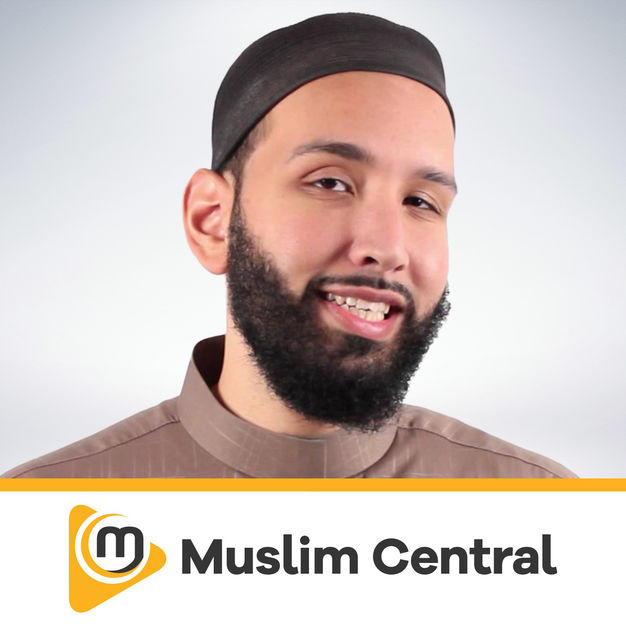 Omar Suleiman
Omar Suleiman
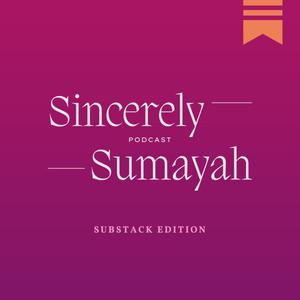 Sincerely, Sumayah
Sincerely, Sumayah
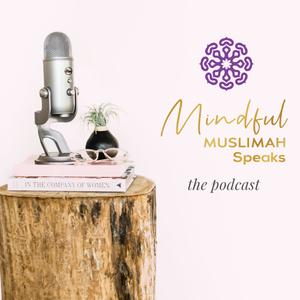 Mindful Muslimah Speaks
Mindful Muslimah Speaks
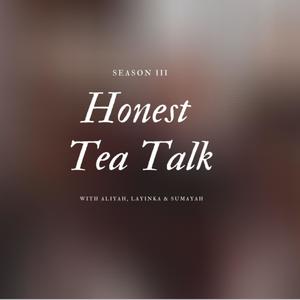 Honest Tea Talk
Honest Tea Talk
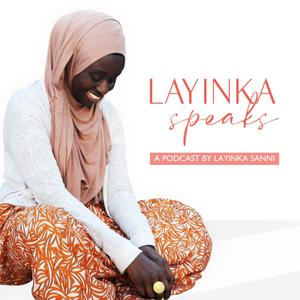 LaYinka Speaks
LaYinka Speaks
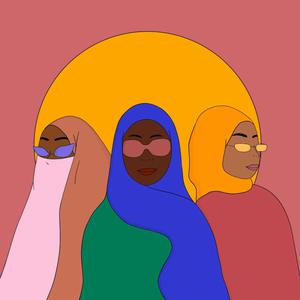 The Digital Sisterhood
The Digital Sisterhood